Front Brake Hose Replacement Dual Piston Caliper
Removal Procedure
- Raise and suitably support vehicle. Refer to Lifting and Jacking the Vehicle in General Information.
- Remove the tire and wheel assembly. Refer to Wheel Removal in Tires and Wheels.
- Clean the hose fittings at both ends. Remove all dirt, grease, and other foreign material.
- Disconnect the brake pipe fitting.
- Remove the brake pipe retainer.
- Remove the brake hose retainer nut and the bolt, if required.
- Remove the ABS sensor wire bracket bolt, if required.
- Remove the bolt and the gaskets.
- Remove the brake hose.
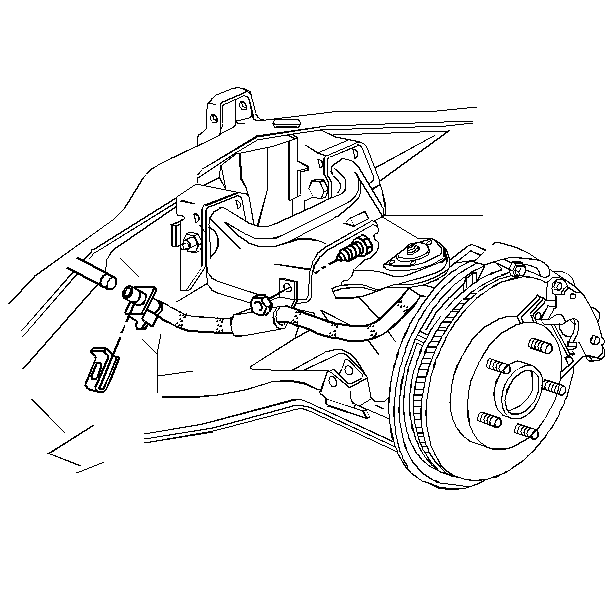
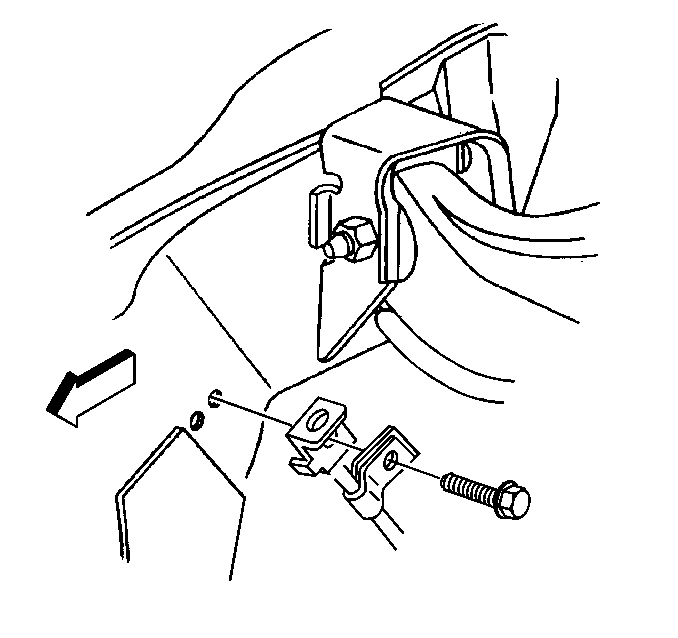
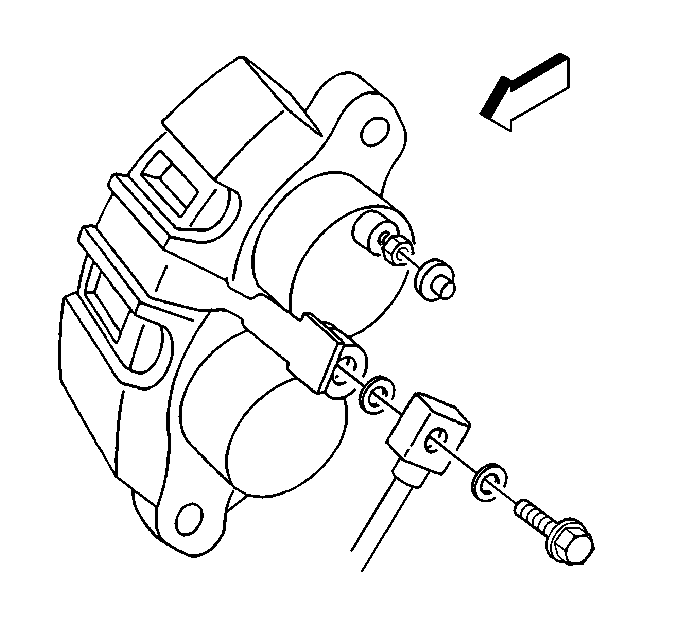
Installation Procedure
- Install the brake hose.
- Install new brass gaskets.
- Install the bolt.
- Install the ABS sensor wire bracket bolt, if required.
- Install the brake hose retainer bolt and the nut, if required.
- Install the brake pipe retainer.
- Connect the brake pipe fitting.
- Bleed the brakes. Refer to Hydraulic Brake System Bleeding .
- Install the tire and wheel assembly. Refer to Wheel Installation in Tires and Wheels.
- Lower the vehicle and remove the safety stands.
Important: After installation, the brake hose must not be twisted and the brake hose must not contact any other components.

Notice: Use the correct fastener in the correct location. Replacement fasteners must be the correct part number for that application. Fasteners requiring replacement or fasteners requiring the use of thread locking compound or sealant are identified in the service procedure. Do not use paints, lubricants, or corrosion inhibitors on fasteners or fastener joint surfaces unless specified. These coatings affect fastener torque and joint clamping force and may damage the fastener. Use the correct tightening sequence and specifications when installing fasteners in order to avoid damage to parts and systems.
Tighten
Tighten the bolt to 54 N·m (40 lb ft).

Tighten
Tighten the bolt to 17 N·m (13 lb ft).

Tighten
Tighten the nut to 22 N·m (16 lb ft).
Tighten
Tighten the brake pipe fitting to 17 N·m (13 lb ft).
Front Brake Hose Replacement Single Piston Caliper
Removal Procedure
- Raise and suitably support vehicle. Refer to Lifting and Jacking the Vehicle in General Information.
- Remove the tire and wheel assembly. Refer to Wheel Removal in Tires and Wheels.
- Clean the hose fittings at both ends. Remove all dirt, grease, and other foreign material.
- Disconnect the brake pipe fitting.
- Remove the brake hose retainer.
- Remove the bolt and the gaskets.
- Remove the brake hose.
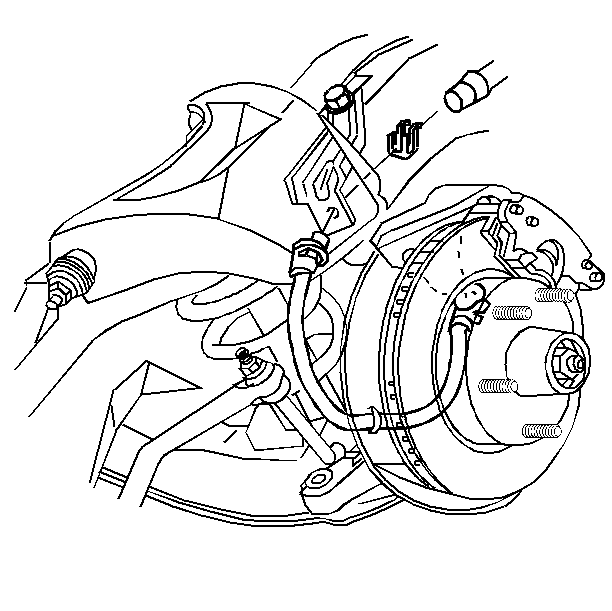
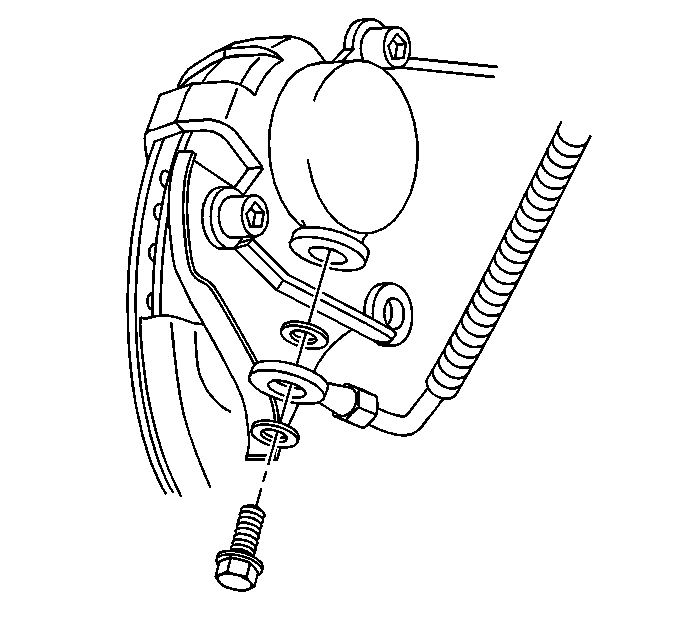
Installation Procedure
- Install the brake hose.
- Install new brass gaskets.
- Install the brake hose to caliper bolt.
- Install the brake pipe retainer.
- Connect the brake pipe fitting.
- Bleed the brakes. Refer to Hydraulic Brake System Bleeding .
- Install the tire and wheel assembly. Refer to Wheel Installation in Tires and Wheels.
- Lower the vehicle and remove the safety stands.
Important: After installation, the brake hose must not be twisted, and the brake hose must not come in contact with other components.

Notice: Use the correct fastener in the correct location. Replacement fasteners must be the correct part number for that application. Fasteners requiring replacement or fasteners requiring the use of thread locking compound or sealant are identified in the service procedure. Do not use paints, lubricants, or corrosion inhibitors on fasteners or fastener joint surfaces unless specified. These coatings affect fastener torque and joint clamping force and may damage the fastener. Use the correct tightening sequence and specifications when installing fasteners in order to avoid damage to parts and systems.
Tighten
Tighten the bolt to 54 N·m (40 lb ft).

Tighten
Tighten the brake pipe fittings to 17 N·m (13 lb ft).
